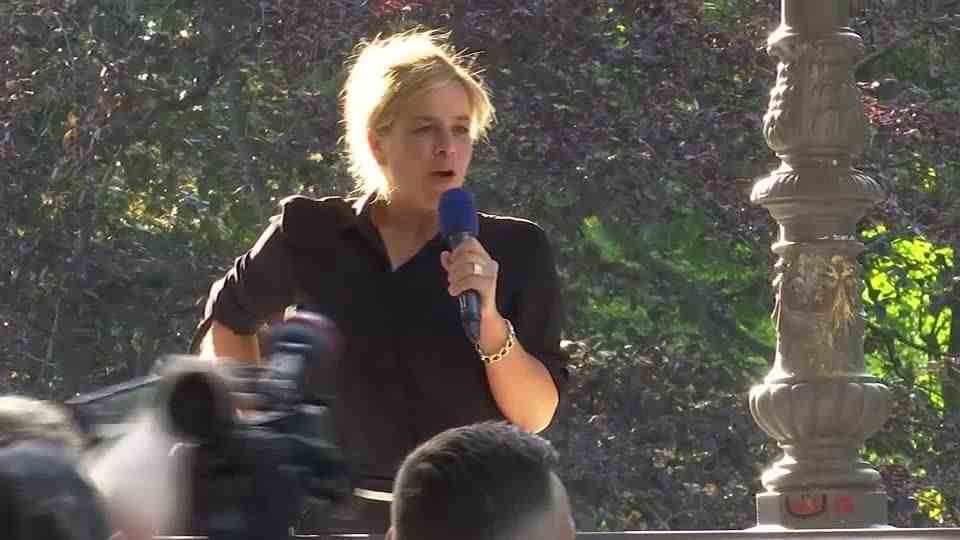State election in North Rhine-Westphalia
Radiant election winners: where the Greens score – and what plans chairwoman Mona Neubaur now has
Mona Neubaur, top candidate for Alliance 90/The Greens
© Marius Becker / DPA
The Greens also had reason to be happy on this election night: they recorded their best election result in North Rhine-Westphalia. The chairwoman of the state association, Mona Neubaur, is planning a “green economic miracle” for the industrial state.
In addition to the CDU, there was another winner in the state elections: The Greens were able to distinguish themselves with the largest increase in votes. Compared to the last elections in 2017, the party was able to almost triple its share of the vote and thus achieved its best result ever in North Rhine-Westphalia. This means that the top candidate, Mona Neubaur, has come closer to her dream of a “green economic miracle” for North Rhine-Westphalia. She wants to make the federal state the first climate-neutral industrial region in Europe. Neubaur could now become the kingmaker of Düsseldorf.
Because the previous black-yellow coalition, despite the election victory of the CDU, is no longer enough due to the weakness of the FDP, the Greens are now coming into focus for the Christian Democrats and their incumbent Prime Minister Hendrik Wüst as a possible coalition partner. But the SPD could also form a traffic light government with a clear majority with the Greens and the FDP.
On the evening of the election, Neubaur is still keeping a low profile on possible preferences. She is happy about the “leap of trust” and speaks of a “huge order for us”. The Greens would talk to all democratic parties, she announced.
Mona Neubaur: NRW is an industrial state at heart – and should remain so
The Rhinelander by choice, Neubaur, was born in Pöttmes, Bavaria, and has lived in her adopted home of Düsseldorf since studying education, psychology and sociology – out of “complete conviction”, as she says herself. After graduating, she initially worked in the energy industry for an alternative energy supplier.
Since then she has also been involved with the Greens. She also worked for seven years at the party-affiliated Heinrich Böll Foundation in North Rhine-Westphalia, from 2010 to 2014 as managing director. Neubaur became an active party member in 2005, and two years later she was already elected spokeswoman for the Düsseldorf Greens. Chair of the national association since 2014.
She describes her “green economic miracle” in North Rhine-Westphalia as a future that is “climate-neutral, social and digital”. North Rhine-Westphalia is “the land of coal and steel, it is an industrial country at heart”. According to the ideas of the Green politician, who likes to visit football games at Fortuna Düsseldorf in her free time and who says she has a weakness for Düsseldorf mustard, it should stay that way – but driven by renewable energies and clean technologies.
“Explore in which coalition we can implement the most green content”
On Sunday, Neubaur and the North Rhine-Westphalian Greens benefited from the exodus of former SPD and CDU voters – and also from the national trend of their own party. In the election campaign, she noticed that the “political style” of the ministers in the Berlin traffic light coalition had helped the state Greens, says Neubaur in Düsseldorf. It is about “having attitude and a compass in times of crisis”, “communicating honestly” and “nevertheless finding pragmatic ways”.

And what’s next for the Greens? According to their political director Emily Büning, the Federal Greens in North Rhine-Westphalia can imagine a coalition with the CDU as well as with the SPD and FDP. Büning said on ZDF on Sunday evening: “We will now hold talks in the next few days and explore (…) in which coalition we can implement the most green content.” That has priority.
The federal government is currently in a “very constructive relationship” with the SPD and the FDP. “We see in NRW that we now have an order to explore a coalition,” added Büning. “We can imagine that with the CDU as well as with the SPD and FDP, depending on where we implement the green content.”
Büning said the Greens had started in North Rhine-Westphalia to “break the deadlock, to bring about a change in policy with us Greens”. The outcome of the election showed that voters believed the Greens were the party that provided the answers to the most pressing questions.

